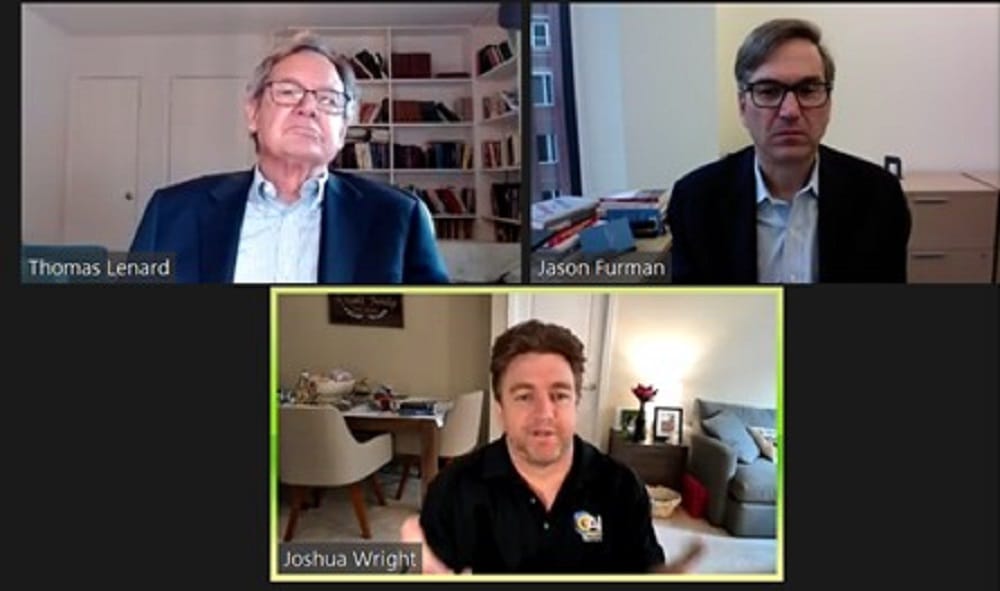Debaters Consider Whether a New Agency to Regulate Tech Platforms Would Do More Harm Than Good
November 9, 2020 – At a formal debate on whether technology platforms require a new regulatory regime, two well-established experts also clashed over how seriously policy-makers should take the recent House Judiciary Antitrust Subcommittee report on breaking up big tech companies. In the Technology

November 9, 2020 – At a formal debate on whether technology platforms require a new regulatory regime, two well-established experts also clashed over how seriously policy-makers should take the recent House Judiciary Antitrust Subcommittee report on breaking up big tech companies.
In the Technology Policy Institute debate between Jason Furman of Harvard’s Kennedy School and Josh Wright of George Mason University’s Global Antitrust Institute on October 26, Wright prevailed in that he persuaded more people to flock to his point of view.
Polled before the debate on whether a new regulatory agency should be established, 60 percent said yes and 40 percent said no. After the debate between economic policy professor Furman and Wright, a law professor and executive director of the institute, 30 percent said yes and 70 percent said no.
Does the current antitrust system work with tech platforms?
“I support a pro-competition light touch regulator that focuses on an enforceable code of conduct, greater data mobility, and systems with open standards and more data openness,” said Furman, who was chair of the Council of Economic Advisors under President Barack Obama.
Such a system would make antitrust clearer and more predictable by curbing tech company abuses and allowing users to use different services, switch services, and enable more real and potential competition from new entrants, Furman said.
But Wright, a Republican-appointed commissioner at the Federal Trade Commission from 2013 to 2015, said the real question was how well the existing antitrust infrastructure and consumer protection laws were performing.
Wright said current institutions were performing well because they were “very effective” at addressing anticompetitive conduct when it arose and were capable of being applied in a manner that distinguishes anticompetitive conduct, identifies market failure, and provides remedies where needed.
Good antitrust regulation identifies and carefully distinguishes between anticompetitive conduct without deterring procompetitive conduct, he said. Wright did not feel that a new regulatory regime would do as good a job at achieving these goals under consumer welfare standards.
Can bright line rules stop hundreds of acquisitions by Big Tech?
Furman said that the current system was not effective at handling mergers. Some of the big tech companies have grown organically and through hundreds of mergers. Because we cannot “put the toothpaste back in the tube” and undo these mergers, the country needs a new agency to regulate them. He also proposed a “bright line” rule against new mergers for tech companies.
Wright retorted that there was no empirical evidence that the merger system wasn’t working. He compared the idea of a bright line rule to the law under guidelines issued pursuant to Section 7 of the Clayton Act. These guidelines consider mergers presumptively unlawful only when they lead to a market share greater than 30 percent.
In the past decade, the number of successful defensive mergers challenges by the government was three, according to Wright.
But Furman argued that both Democratic and Republican administration have failed to blocked any important mergers in the tech space.
Banning vertical integration by tech companies?
To Furman, so much consolidation has already happened that the country needs a code of conduct for tech platforms going forward. Such an agency needs to combat problems that arise from a platform preferencing their own search results or creating standards that made it difficult to move between platforms.
One of the agency’s chief goals should be to promote data portability, meaning that a person could use any platform to engage with any other platform, just like email.
The two disagreed about whether a ban on mergers by tech companies could lead to a ban on vertical integration by technology companies. A half-century ago, such vertical combinations were suspect under antitrust law, but are now generally permitted. Wright took issue with Furman’s suggestion that such a ban was a “strawman,” or an absurd hypothetical suggestion.
“I wish banning vertical integration were a strawman,” said Wright. “I’m not saying it’s your strawman, but it’s not a strawman and it exists in the House report, it exists in [Democratic Sen. Elizabeth] Warren’s proposals, it exists in banning particular forms of vertical integration in allowing Walmart to sell private label products or Apple to have apps in its app store, or Google to have Google Maps.”
Such vertical integration is a pervasive function of a modern technology economy, and suggestions for banning such integration “are getting a lot of attention and have been proposed inside new regulatory regimes.”
Besides which, Wright said, creating a new regulatory agency would simply exacerbate the two-way antitrust fight between the Justice Department antitrust division and the FTC and turn it into a three-way fight.
A pathway toward regulating a maturing tech industry?
Furman replied that there were obviously good and bad ways to regulate and that he was against the bad ones and in favor of the good ones.
He pointed to mature industries that have been successful with regulated networks like energy, telecom and transportation. Interestingly, both debaters agreed that there were competition problems in the healthcare industry that should have been better addressed by regulatory agencies and by the courts.
Senior Fellow and Emeritus TPI President Tom Lenard moderated the debate.








